At Vernon Court Reporters, with over 43 years of experience in court reporting and legal transcription, we understand the critical role that transcription foot pedals play in the legal industry. A high-quality foot pedal isn’t just a tool; it’s an integral part of a transcriptionist’s setup that can significantly enhance productivity and accuracy. Here, we review some of the top foot pedals on the market, each chosen for its ability to improve performance and reduce the physical strain associated with prolonged transcription tasks.
Why Invest in a Quality Transcription Foot Pedal?
Transcription foot pedals allow transcriptionists to control audio playback hands-free, using their feet to play, pause, rewind, or fast forward without interrupting their typing flow. This capability is essential in a legal setting where accuracy and speed are paramount. Efficient use of a foot pedal can drastically reduce the transcription time and increase a transcriptionist’s ability to focus on the content, which is critical for producing precise legal records.
For more insights on how transcription enhance performance, you can read about their benefits, which highlights the ergonomic and efficiency gains from using these devices.
How to Choose a Good Transcription Foot Pedal?
Choosing the right foot pedal for transcription involves considering several key factors. Here’s what to look for when selecting the best foot pedal for your needs:
Design: Comfort and ergonomics are crucial since transcriptionists spend long hours using foot pedals. Look for a design that minimizes strain and fits well with your foot movements.
Durability: Transcription foot pedals need to withstand extensive use. Ensure the pedal is made of durable materials that can endure frequent and prolonged use without degrading in performance.
Compatibility: Make sure the foot pedal is compatible with your transcription software and operating system. Some pedals offer broader compatibility than others, so it’s essential to check this before purchasing.
Price: Foot pedals can range from very affordable to quite expensive. Set a budget but ensure that your choice balances cost with the necessary features and durability.
Type: Decide between wired and wireless foot pedals. Wireless options can reduce cable clutter and provide more flexibility, but make sure they have a reliable connection and sufficient battery life.
Customizability: Some foot pedals offer customizable functions, allowing you to program different commands to each pedal. This can enhance efficiency and tailor the device to your specific workflow needs.
Top Foot Pedals Recommended for Legal Transcriptionists
Infinity USB Digital Foot Pedal
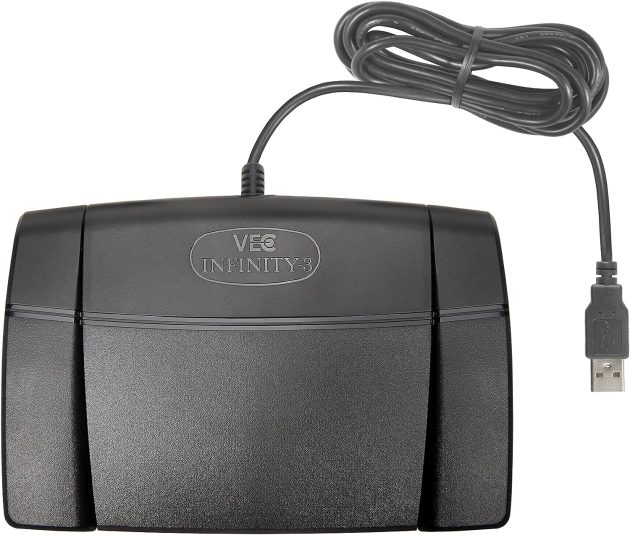
This foot pedal is a favorite among professional transcriptionists for its reliability and ergonomic design. It features three pedals that allow easy control over play, rewind, and fast-forward functions, designed to withstand heavy use without degradation. Its compatibility with multiple transcription software makes it a versatile choice for legal environments where different systems might be in use.
Pros:
- Wide Compatibility: Works with a variety of transcription software and systems.
- Durable Construction: Built to last with high-quality materials.
- Ergonomic Design: Comfortable for extended use.
Cons:
- No Wireless Option: Only available as a wired model.
- Basic Features: Lacks advanced customizability options.
Pricing: The Infinity USB Digital Foot Control (IN-USB-2) typically costs around $60, making it an affordable and reliable choice for transcriptionists.
AltoEdge USB Foot Pedal
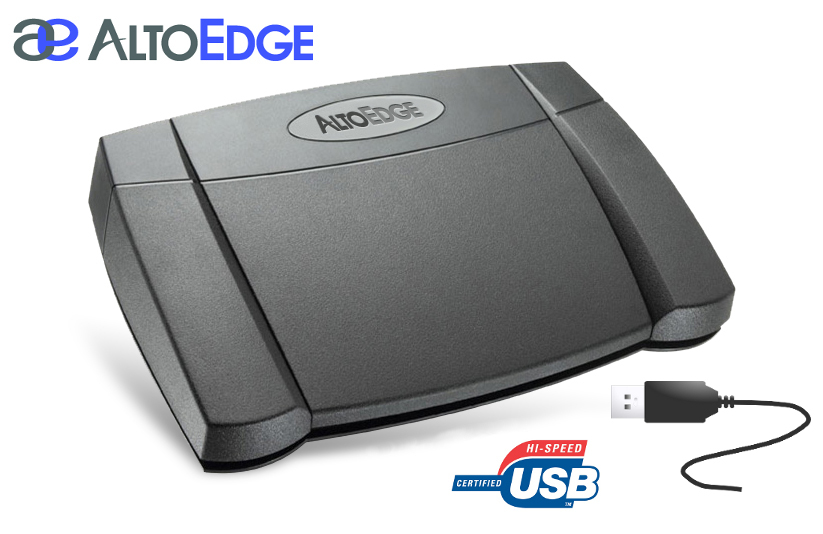
The AltoEdge USB Foot Pedal is a versatile and reliable tool designed specifically for transcriptionists. It features three pedals for controlling playback, making it easier to manage audio files hands-free. Notably, the AltoEdge USB Foot Pedal is the only foot pedal that works with the free version of Express Scribe (read our review), providing a cost-effective solution for transcriptionists using this popular software.
Pros:
- Compatibility with Express Scribe Free Version: The only foot pedal that works with the free version of Express Scribe, making it a unique and valuable option for cost-conscious transcriptionists.
- Durable Construction: Built to withstand extensive use with high-quality materials.
- Ergonomic Design: Comfortable to use for extended transcription sessions, minimizing foot fatigue.
- Plug-and-Play Setup: Easy to set up and use, with no complicated installation required.
Cons:
- Wired Only: Does not offer a wireless option, which may be a drawback for those looking to reduce cable clutter.
- Basic Features: Lacks advanced programmable options available in some other models.
Pricing: The AltoEdge USB Foot Pedal is priced around $99, offering excellent value for its unique compatibility with Express Scribe and durable design.
Philips USB Transcription Foot Control
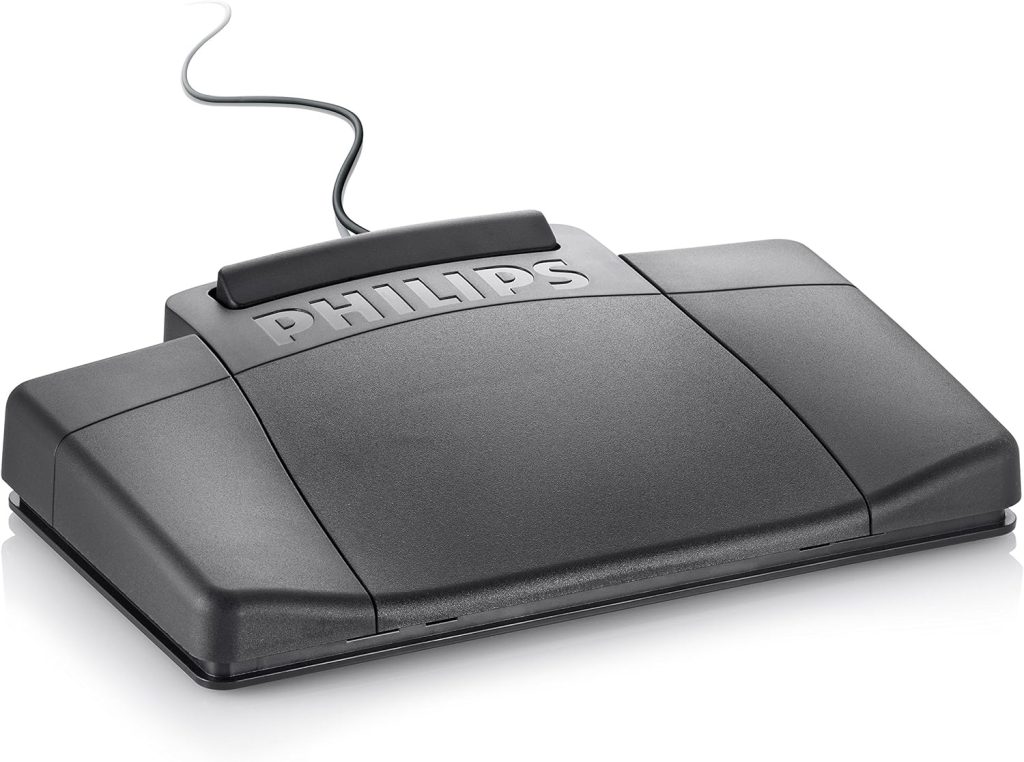
The Philips foot pedal offers a bit more in terms of functionality with its four-pedal system, providing additional customizable controls. It’s built for durability and includes an anti-slip pad to ensure it stays in place, even during the most intensive transcription sessions. The robust construction and magnetic switches are designed to endure long periods of use without failure.
Pros:
- Customizable Pedals: Allows for programmable functions tailored to your needs.
- Comfortable Design: Ergonomic layout reduces foot strain during long sessions.
- Robust Build: Durable materials ensure long-lasting use.
Cons:
- Price: More expensive than some other models on the market.
- Wired Only: Does not offer a wireless option.
Pricing: The Philips ACC2330 Foot Pedal is priced at around $100, reflecting its advanced features and customizability.
X-keys XK-3 Rear Hinged Foot Pedal
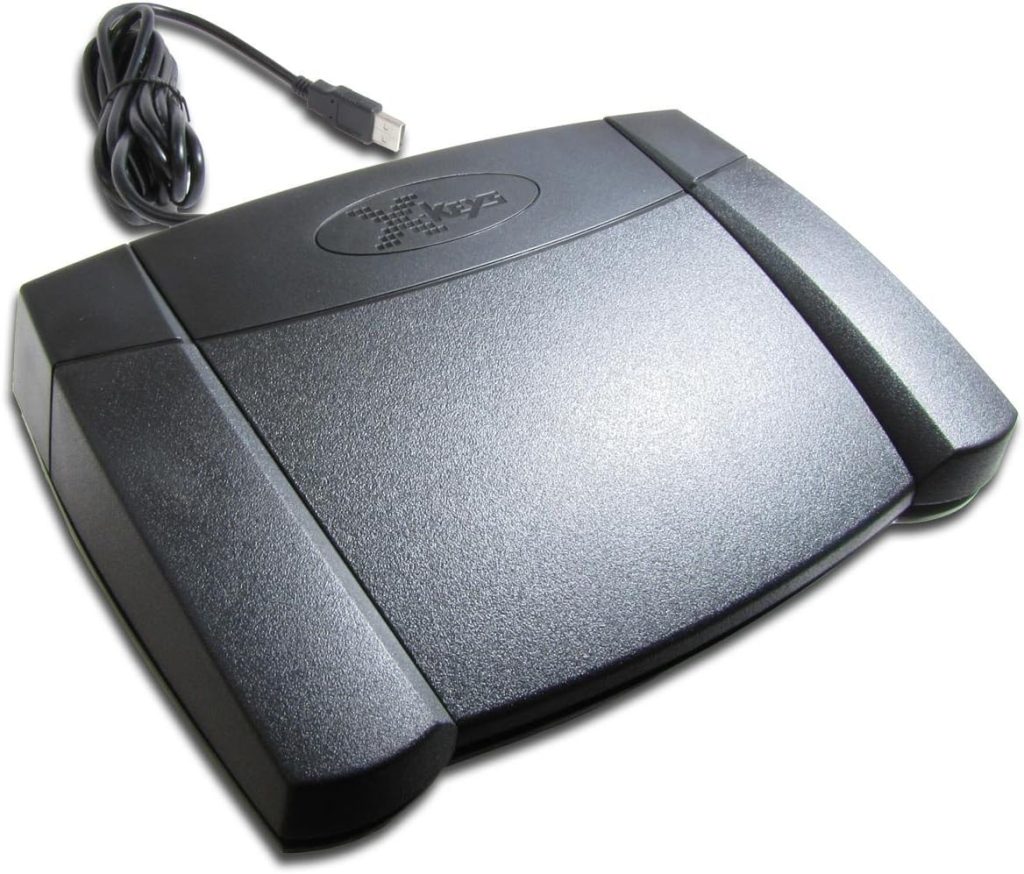
For those looking for flexibility in their transcription work, the X-keys foot pedal is an excellent choice. It features programmable pedals that can be set for various functions, enhancing the transcription process. The rear-hinged design is perfect for continuous playback control, making it ideal for long audio files typical in legal proceedings.
Pros:
- Highly Customizable: Each of the three pedals can be programmed with specific functions to suit individual workflows.
- Durable Build: Constructed with high-quality materials to withstand extensive use.
- Ergonomic Design: Comfortable to use for long transcription sessions, minimizing foot strain.
- Wide Compatibility: Works with various transcription software and systems.
Cons:
- Setup Complexity: Programming the pedals can be more complex compared to simpler models.
- Price: Higher cost due to advanced features and customizability.
Pricing: The X-keys XK-3 Foot Pedal is priced around $125, reflecting its advanced features and high level of customizability.
vPedal vP-4 MKII Wireless Transcription Foot Pedal
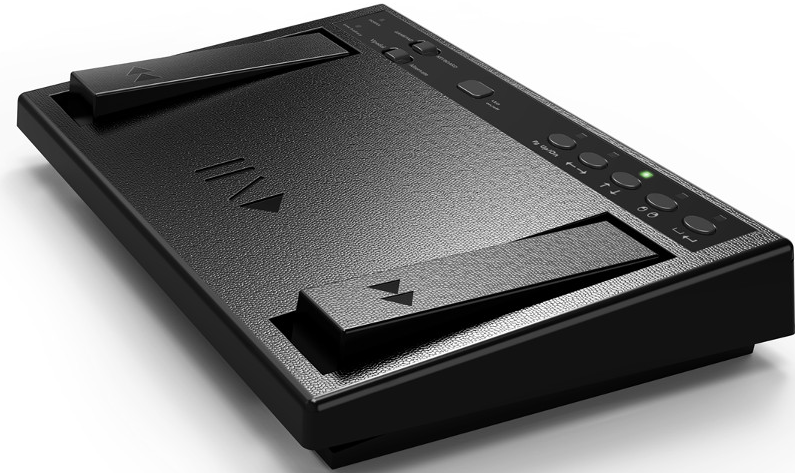
If you prefer a clutter-free workspace, the vPedal vP-4 MKII offers a wireless solution with a range of up to three meters. It uses a USB dongle for connectivity and is powered by AA batteries, offering both convenience and reliability. The pedal’s use of magnets for button presses ensures quiet operation, which is beneficial in the focused environment of legal transcription.
Pros:
- Wireless Convenience: Eliminates cable clutter and offers greater flexibility in workspace setup.
- Durable Construction: Built to last with high-quality materials, ensuring longevity.
- Ergonomic Design: Designed for comfort during extended use.
- Wide Compatibility: Compatible with a variety of transcription software.
Cons:
- Battery Life: Requires monitoring and managing battery life for uninterrupted use.
- Price: Higher cost compared to wired models due to wireless technology.
Pricing: The vPedal vP-4 MKII Wireless Foot Pedal is available for approximately $150, offering the benefits of wireless convenience and robust performance.
Olympus RS-27H Transcription Foot Pedal

The Olympus RS-27 Foot Pedal is a highly effective tool designed for professional transcriptionists seeking to enhance their efficiency and productivity. This foot pedal features three ergonomic pedals for play, rewind, and fast-forward functions, allowing users to control audio playback without removing their hands from the keyboard. Its durable construction and reliable performance make it suitable for extended use, ensuring that transcriptionists can work comfortably for long hours. Additionally, the foot pedal is compatible with various transcription software, providing versatility and seamless integration into existing workflows. For those looking to optimize their transcription setup, the Olympus RS-27 Foot Pedal is an excellent choice.
Pros:
- Ergonomic Design: Comfortable for long transcription sessions.
- Durability: Made with robust materials to withstand heavy use.
- Compatibility: Works well with a variety of transcription software and operating systems.
- Ease of Use: Simple setup and intuitive operation.
Cons:
- Wired Only: No wireless option, which could be a drawback for those looking to minimize cable clutter.
- Limited Customizability: Lacks advanced programmable features available in some other models.
Pricing: The Olympus RS-27 Foot Pedal is priced around $70, offering good value for its reliability and durability.
Your Choice Matters
Choosing the right transcription foot pedal can significantly impact your productivity and comfort. It’s essential to consider how each pedal’s features align with your specific transcription needs, especially in the legal field where precision is crucial. We recommend testing various models to find the perfect fit for your setup.
As always, we are here to provide expertise and support to the legal community. Let us know your experiences with these pedals or if there are others you’ve found effective for legal transcription work. Your feedback is invaluable as we continue to recommend the best tools for legal professionals.
FAQ
A transcription foot pedal is a device used by transcribers to control audio playback with their feet, allowing for hands-free operation while typing. This enhances efficiency and accuracy by enabling seamless navigation through audio files.
A transcription foot pedal connects to your computer, usually via USB, and is compatible with transcription software. By pressing the pedals, you can play, pause, rewind, and fast-forward audio without using your hands.
Using a foot pedal improves transcription speed and accuracy, reduces the risk of repetitive strain injuries, and allows for more efficient multitasking.
Key features to consider include compatibility with your transcription software, ergonomic design, durable construction, and customizable pedal functions.
Most transcription foot pedals are compatible with popular transcription software. However, it’s important to check the compatibility specifications before purchasing.
Yes, transcription foot pedals can be used with laptops. They typically connect via USB and are recognized by most transcription software.
Some highly recommended transcription foot pedals include the Infinity USB Digital Foot Control, Olympus RS27H, and Philips ACC2310.


